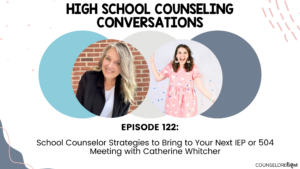Here’s the thing: there’s no RIGHT or WRONG way to divide your school counseling caseload. You just have to figure out what works best for you, your students, and your school.
Maybe your group has always done the same thing and you’re looking for a better way to serve your students because something just isn’t working right. Maybe you’ve been given another allotment for a full-time school counselor, and you have some new flexibility to lower your caseload size (YAY)!
Here are just a few examples of how you could split your school counseling caseloads:
- grade level (each counselor always works with the same grade level each year)
- alphabetically by the last name
- ninth-grade counselor the same every year and then alpha split for everyone else
- stay with a class and roll with them through graduation
- roll with a class through graduation and use an extra counselor to help with seniors
- use an extra counselor as a “college and career counselor”
- and so many more unique combinations of these!
Read on for 5 questions to consider when evaluating how your school counseling caseloads can and will be divided.

School Counseling Caseload Consideration #1- How many counselors does your school have?
This will give you a good starting point to begin your evaluation of the school counseling caseload division.
Is there a chance more school counselors may be added in the future (to lower your caseload)? Think to the future for a second.
You’d want to consider how adding a counselor or two would change whatever model you decided on. The number of counselors you currently (or will) have may rule out some options for different models or caseloads.
Consider if all counselors’ roles will all share (mostly) the same duties. If there is one counselor whose only job is “college and career” or they are a part-time “graduation coach,” those roles will look different from the rest of the team. They may not have the hours in the day to dedicate to an entire caseload which may be pause for consideration before moving forward.
School Counseling Caseload Consideration #2- How are the administrators' caseloads split?
I definitely do not think this is the question to base your entire caseload model decision on.
In my experience, administrators seem to be a bit more resistant to change and like to stick with what they’ve been doing or stick with what they know to be comfortable.
I believe your counseling team can make a decision regardless of how the admin team is split. The question, however, can just be part of the conversation.
If you’re looking for ways to keep some healthy conversation open with your administrator, read this blog post for ideas.
I’d start these conversations with administrators as EARLY as possible… even before you get into a new semester or new school year. They will want a lot of time to consider any big changes and, even practically speaking, you’ll need to get the word out if there are big changes.
School Counseling Caseload Consideration #3- What are the strengths of your school counseling team?
What does your school counseling team enjoy doing? Where do they shine? Can they grow, learn, and adapt?
I have always loved helping a team grow by discovering, understanding, and sharing our strengths with one another. My favorite assessment like this to do with a team is Strengths Finder (affiliate link). I’ve done this with my school counseling team and my administrator team at a beginning of the year planning meeting.
It may be tempting to say that our strengths are in the familiarity of what we know. Of course, our confidence builds when we get good at our jobs and our daily/monthly/yearly tasks.
There will always be tasks that we more naturally gravitate to, tasks that we despise, and even tasks that make us feel “less than” or not as competent! (If you’re a new high school counselor, head over to read this advice to new school counselors… imposter syndrome is real and alive!)
Some school counselors may be resistant to change because they are comfortable, for example, only working with ninth-graders while avoiding working with twelfth graders; of course, it would be uncomfortable to lean into that change, but it may be an awesome opportunity for a mindset shift and professional growth.
Consider mapping out your year and dividing up who takes the lead on what.
School Counseling Caseload Consideration #4- How many students are on each counselor's caseload?
Depending on the model you are looking at using, there may be one that stands out more than the others based on the size of the caseload.
A goal for the model should be keeping the school counseling caseload SIZE in mind. Less students on a caseload will give both the students and the school counselors a better overall experience, more accessibility to strong school counseling services, and less burnout on behalf of the school counselor.
School Counseling Caseload Consideration #5- What is best for students and families?
I am absolutely confident this is the most important question to consider when splitting school counseling caseloads (and an important question to consider when we look at a variety of programming decisions).
This is the primary funnel that all questions should be run through regarding our comprehensive school counseling program. When we keep students and families at the forefront of our decision-making, we will remember our WHY.
We will think outwardly for those we serve. We will be able to answer “how are students different because of our school counseling services?” in the most genuine way because we really do have their best interests in mind.
Will relationships grow deeper because of our student/counselor caseload model? Will students have better and more intentional access to their school counselor because of the way our caseload is set up?
Once you’ve decided on a caseload model and you sit down to plan more specific roles and responsibilities, get ready to plan your year with confidence as you incorporate strategic community partnerships, engaging lessons, and meaningful advocacy efforts!
Check out this email challenge series to up your advocacy game as a high school counselor!






